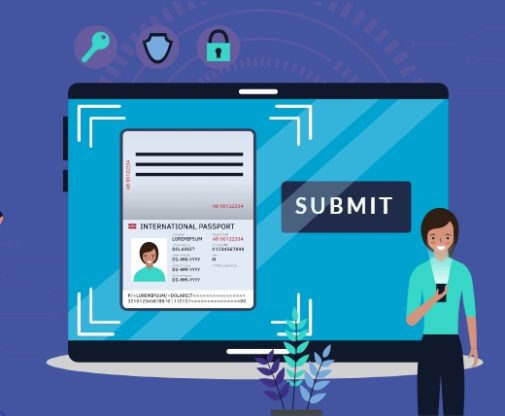





How Right to Work check software can help ensure compliance with employer guidance in the UK and Ireland.
Request a quote
If you employ people in the UK or Ireland, you are probably aware of the legal requirement to check that all employees, regardless of their nationality, are eligible to work through Right to Work checks.
For organisations of every size, in every sector, making consistent, reliable and quick Right to Work checks is important. However, with diverse workforces and more flexible ways of working, the challenge of making checks on employees is growing.
At the same time, compliant Right to Work checks are as important as ever. Being able to demonstrate that you have carried out a Right to Work check, in accordance with Home Office guidance, can help you establish a statutory excuse and protect your organisation from illegal working penalties.
In April 2022, the UK Government updated Right to Work guidance and launched a Digital Right to Work Scheme. This allows employers to remotely verify the Right to Work status of a potential employee by partnering with an Identity Service Provider (IDSP). As a leading certified IDSP and Right to Work service provider, we know there are lots of questions about the change in legislation so we’ve put together this document answering the most frequently asked Right to Work questions.
If you have questions about how you can remain compliant when onboarding employees, take a look at our employers guide to Right to Work compliance here:
Read here!





Our expert identity team are ready to answer any questions.
Let’s talk identity…
+44 (0)118 228 0939

Range of easy to use Right to Work service to prove compliance and support an employer's Statutory Excuse, 365 days a year.

We're a certified IDSP offering straightforward, remote, digital Right to Work checks

Global identity documents checked in seconds. Proven, industry-leading verification on a pay-per-check basis.
Every employer in the UK is required to carry out a Right to Work Check on all prospective employees or volunteers before they start work. A UK Right to Work Check is carried out to confirm whether a prospective employee can legally work in the UK. The employer carries out the check by verifying eligible documents from the employee and securely recording details of that check.
Proving Right to Work in the UK relies on an applicant providing an eligible document from List A or List B of the employers’ right to work check guidance.
An employer can ask their applicants to prove their Right to Work in different ways, depending on their onboarding process and an employee’s immigration status. Technology from Identity Service Providers (IDSPs) can support Right to Work checks. Find out more about Right to Work check services here.
Right to Work documents are proof of a person’s eligibility to work in the UK. Digital Right to Work checks require an in-date British or Irish passport or Irish passport card. But for manual checks, many forms of identification can be used including out of date British passports. A full list of eligible Right to Work document is available on the government website.
According to the latest government guidance on Right to work checks, there are different ways for employers to conduct compliant right to work checks:
– Manual Right to Work checks which involves checking an original, physical document.
– Digital Right to Work checks which can be carried out in partnership with an Identity Service Provider (IDSP)
– Online Right to Work checks using the Home Office online verification service.
All of these methods can be supported by TrustID.
There are 3 key steps in a manually checking an employee’s documents to determine if they have the right to carry out the type of work you are offering:
Some employees have an immigration status which can be checked online, including those under the EU Settlement Scheme. In that case, you may use the Home Office’s online checking service. You should still check that the photograph matches the holder and retain evidence of the check.
Since April 2022, holders of UK/Irish in-date biometric passports can be checked using an Identity Service Provider (IDSP) through the digital Right to Work Scheme.
Under the Immigration, Asylum and Nationality Act 2006 and the Immigration Act 2016, every UK employer has a legal responsibility to ensure that all their employees have the right to work in the UK. If an employer doesn’t comply with their duties around UK Right to Work checks and has “reasonable cause to believe” that an individual was not entitled to work in the UK, they can face serious penalties, including fines of up to £20,000 for each illegal worker employed and a possible prison sentence. Current plans will double fines in 2024.
At TrustID, we are the leading provider of Right to Work check services and a trusted IDSP. Our straightforward, easy to use Right to Work checking software helps to quickly and reliably assess whether the documents you are seeing are genuine and whether they give the holder the Right to Work in the UK. Our IDVT can help with candidate onboarding, whether you make digital or physical document checks. The service is regularly updated in line with the latest guidance, meaning you no longer need to be Right to Work experts and it’s backed up by a leading team of document analysts, fully trained in global identity documents and Home Office Right to Work guidance. Results are returned within 1 working hour, 7 days a week. Our services help you to meet Medium Level of Confidence and High Level of Confidence checks, in line with GPG 45.
A digital Right to Work check allows applicants with applicable proof of identity to verify their identity and prove their Right to Work remotely, instead of presenting physical documents to you as an employer. Under the Digital Scheme, an employer can carry out a digital Right to Work check on holders of UK & Irish in-date biometric passports using IDVT from an Identity Service Provider (IDSP). The IDSP will share a Right to Work report for your records. Anyone with a UK Visas and Immigration (UKVI) account – including those who applied to the EU Settlement scheme – is also eligible for a remote or digital Right to Work check. They can access their immigration status online through an eVisa and provide a share code to the employer for checking. Some IDSPs, including TrustID, can support an online share code check.
An Identity Service Provider, or IDSP, is a provider of identity verification services or Identity Document Validation Technology (IDVT). IDSPs are sometimes referred to as ‘identity providers’. Some IDSPs are certified to supply ID verification to specific government standards and ‘Levels of Confidence’ to support digital Right to Work checks (and Right to Rent or DBS checks).
Yes, the most recent Home Office guidance for UK Employers has introduced a Digital Right to Work Scheme, enabling employers to verify the identity of individuals remotely with relevant documents through an IDSP (Identity Service Provider).
The guidance states that a Right to Work check must be carried out on all employees, regardless of their nationality and you should never make assumptions about someone’s eligibility to work in the UK. You can check the Right to Work status of a British citizen using either a UK passport through the digital scheme or by checking a physical document from a combination of documents from List A of the Home Office UK Right to Work guidance.
TrustID can support Right to Work eligibility checks in Eire, complying with Irish employment laws. The Right to Work service streamlines Right to Work verification, depending on where the employee is actually employed by requesting the eligible documents for the region – either UK or Ireland.
From March 2020, due to the Covid-19 pandemic, Right to Work guidance was temporarily amended to allow employers to check a candidate’s RtW status using scanned copies or photos of identity documents. You could then arrange a video call and ask the applicant to hold up the original documents to check against the digital copy. However, these measures came to an end on 1st October 2022.
Today, the Home Office and Disclosure and Barring Services (DBS) allow employers and landlords to use certified Identity Service Providers to carry out digital identity checks on their behalf, as part of Right to Work and digital DBS checks. It is highly recommended that employers use a certified IDSP.
eVisa holders can also be checked online if they provide their employer with a share code to verify their right to work.
Once you have seen applicable documents from your employee, you must retain a copy of them and record the date of the check. You should then store secure, unalterable copies of the documents for the duration of a person’s employment, plus two years after their employment has come to an end. You should be able to produce copies of all relevant documents if requested to do so: if you’re found to be employing a potential illegal worker and you’re unable to produce evidence of a Right to Work Check, you may be liable for a civil penalty.
What questions should you ask when considering an IDSP?
Read our latest update to find out more
What being ISO certified means
Our ISO 27001 certification shows that we follow information security best practice, helping to eliminate or minimise the risk of a security breach, keep information secure and ensure compliance with data protection regulations. Our ISO 9001 certification demonstrates that we’ve implemented a Quality Management Systems (QMS) to continuously improve our existing products and services. By achieving ISO 27701 certification, TrustID demonstrates its commitment to data privacy and security, by implementing a comprehensive framework to safeguard personal data and comply with privacy regulations.
